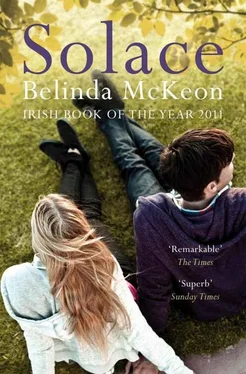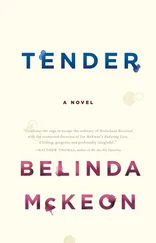‘You are a useless, self-pitying, fucking arsehole, and I wish to God I’d never set eyes on you.’ That was Joanne’s take on what he was. It was not constant, this perspective of hers; it was not always that she felt this way, but it seemed to be most of the time now. She was just tired, he knew. Was the word ‘harried’? He thought so. But that word seemed tied to ‘harridan’, which was something, he knew, he was absolutely not to call her. But, Jesus, if it wasn’t tempting sometimes. She was still sore, he was aware of that, and she was shattered, and she was as scared of the baby as she was infatuated with her. And Mark knew, from what he was feeling himself, how these states of mind fed on and compounded each other, how the fear rendered the adoration the most terrifying thing you could feel, how the adoration warped and whittled the fear. You were afraid, half of the time, even to move.
But still. This was his baby too. This was his daughter. And it was hard to hear Joanne talking to him like that. It made everything even more exhausting. And part of the trouble was that he was certain, now, that he loved her. Loved Joanne. There hadn’t been time for it to happen the way it usually did. There hadn’t been that sinking from lusting to liking to loving. They had been seeing each other, and fucking each other, and getting on with each other, and suddenly they had been staring at each other in the kitchen of her house in Stoneybatter, Mark holding a bottle of champagne, Joanne holding a pink thing that looked like a pen, and then Joanne was crying her eyes out and Mark was hearing the blood thump in his ears. They had gone back and forth for hours — would she keep it, would she have it, would they stay together, would they forget this had ever happened, would they have any money, would they have any future, would he please put down that fucking champagne. And, apart from the detail about the champagne, that had been the pattern of their conversation for days afterwards. For weeks.
He had not pressured her either way. He had not told her what to do. He had not told her what he wanted — not that he knew what that was. It was only when Joanne made her decision that he realized what he had wanted: when she told him she was keeping the baby, he was stunned by the relief that coursed through him. It was ludicrous, wanting it so much. He had no proper job. He had no money. No way of providing for a child. And with Joanne, he barely even had a relationship. They had been sleeping together for not much more than a month: how could she be pregnant? But she was. And, yes, she told him, yes, it was definitely his. ‘I knew that,’ he said, but what he was thinking was that it had not even occurred to him to ask the question. How good could he possibly be at planning for the future — for somebody else’s future — if he wasn’t quick enough, even, to think of that? But there was no time to dwell on anything: soon she was showing, and soon she was growing big with the child. And there had been arrangements to make, and their parents to deal with, and a house to get in order, and a birth for which to prepare. And of course there had been talk of love. Professions of love. Moments of love. But Mark had never been really sure that he could feel it.
But now he was sure. And it made no sense. Because she was like someone else. Since the last weeks of the pregnancy, really, she had not been herself, what with the fearfulness and the tearfulness and the preoccupation and the panic. And the irritability. And the anger. He knew it had to pass. He knew it had to be normal. It was fear that something would happen to the baby, that she would somehow be neglected, or damaged, or lost. And that was a fear Mark understood.
In the hours after she was born they were both dazed, struck incoherent and disbelieving as though by a sudden loss rather than a gain. They had sat together on the bed in Holles Street, the plastic curtain drawn around the tiny space that had become charged with the shock of their now being three: Mark on the edge of the mattress, Joanne, flushed and wet-haired, propped up against the pillows. And the baby. For over a day, the baby without a name. Then, Aoife Luisne Casey, named after nobody, named for nobody but herself.
Aoife came to them at six in the morning. She had spent a whole night in the struggle towards them. Or away from them. Which was it? Which had she wanted? When they slopped her on to Joanne’s chest, Mark had stared at her and tried to steel himself into feeling whatever it was he was supposed, at that moment, to be feeling. This being, this screaming little being, she was his. She was theirs. What were they supposed to do with her? What were they supposed to do for her? Were they supposed to show her how to live?
Now she was quiet in her mother’s arms, sucking steadily and intently on her bottle. It was a Sunday morning. What Sunday morning, what month, what time of year? Nothing came quickly enough to his mind any more. It took a minute to work it out. It was June, it was summertime. The blinds of the sitting room were still closed. It could be any kind of day out there. At the window, he pulled the cord to reveal a pale blue sky, a dazzle of sunlight, puddles of water on the cement of the back yard. The feral cats that gathered there scattered at the rattling of the blinds. White plastic garden furniture lay around the place, old potted plants that had long since withered and died. Two bicycles were propped up against the red-brick wall, rusted now, tangled with overgrown ivy and with each other.
‘We should bring her for a walk today,’ he said, turning to Joanne, who looked at him with puffed and wary eyes.
‘Bring her where?’
‘To the Phoenix Park. Or into town, along the quays.’
Joanne shrugged. ‘Maybe, after her nap.’
He began to get the pram ready. A bag with her nappies, with wipes, with all the things they would need if she got hungry or cold, or if it rained. Another bag with bottles, something to keep them warm, an extra soother, Sudocrem. Deep inside the pram’s hood, his mother had pinned a religious medal. Some saint. He didn’t know which one. He didn’t know his saints. He knew that Anthony was for lost things, and Jude was for lost causes, and Dymphna was for the mad. But it couldn’t be any of those. He put a hand into the hood and searched for the medal; finding it, he leaned towards it, squinted to see who it was. Brigid. Of course. Brigid of the chubby little crosses made from rushes. St Mel, growing confused in his old age, had accidentally ordained her a bishop instead of an abbess. It was weird, Mark thought, the useless things you remembered from school.
‘No,’ Joanne said suddenly, from the couch. ‘Forget the park. I couldn’t be bothered. Anyway, it’s probably going to rain.’
‘I’ll take her,’ Mark said, but Joanne shook her head.
‘Leave it,’ she said. ‘It’s too much hassle. If you want to be helpful, go out and get something for dinner.’
In Centra he bought steaks and potatoes and a bag of frozen peas, and nappies and baby powder and baby formula and baby shampoo, and a box of cereal for the morning, and a bottle of wine for whenever they would ever again get to sit down together and drink a bottle of wine. And walking back up Arbour Hill he saw that Mossy was at the door. He called up to him, shouted to him not to ring the doorbell. By some miracle of St Brigid and St Jude and St Dymphna, Aoife might have gone to sleep, and if Mossy woke her, Joanne would go mad. But then he realized that in his pocket his phone was ringing, and it was Mossy: Mossy, who’d worked out already that it might not be such a good idea to make a racket at the door. Mark waved, and in a minute he was hugging Mossy, like a drowning man being pulled from the sea.
*
Читать дальше












